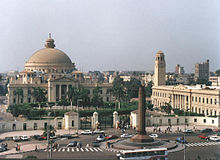By International Christian Concern – Egypt Correspondent –
Gaber Nassar, president of Cairo University, has taken action to end religious discrimination at his institution for good. In a nation where sectarian conflict saturates almost all aspects of life, Nassar has taken a drastic step to reduce this problem on campus.
On Tuesday, October 11, President Nassar decided to remove the category of religion from all university paperwork that applied to students and faculty. The decision is aimed at eliminating any potential discrimination arising from the disclosure of religious identity.
In an interview with an Egyptian television channel, Al-Nahar Al Youm, Nassar said, “We noticed several complaints about the possibility of discrimination between students due to the mention of religion.” He continued, “I was surprised to learn that a department head…was distributing an application that included the religion and the denomination [of students].”
Nassar is familiar with the Egyptian policy of using religious inquiry categories to discriminate against minority groups. He also added that when students are asked to reveal their religion, they may feel the threat of forthcoming discrimination simply because of the disclosure.
Now, both students and faculty at Cairo University will no longer be required to identify their religious preference in paperwork. This applies to both undergraduate and postgraduate levels of the institution.
“At Cairo University, we don’t make random decisions, we make decisions to amend illegal or unconstitutional situations,” Nassar stated on Al-Nahar Al Youm.” The decision was a solution to currently existing problems…the university is a place of study and whoever enters it is aiming to study, thus it isn’t necessary to inquire about someone’s religion.”
Nassar has promised that those who refuse to abide by the new decision will face disciplinary action.
The Cairo University decision comes months after a draft bill was introduced to the Egyptian Parliament aimed at removing the religious identity field from national identity cards. On June 1, 2016 Egyptian Member of Parliament Alaa Abd El-Meneim presented the bill entitled “Citizenship” that included this article. The issue has long sparked public debate.
According to Article 53 of Egypt’s Constitution, “Citizens are equal before the law, possess equal rights and public duties, and may not be discriminated against on the basis of religion, belief, sex, origin, race, color, language, disability, social class, political or geographical affiliation, or for any other reason.”
Highlighted as the frontrunner of the list, discrimination based on religion is prohibited by Egypt’s constitution. But still, Egypt requires religious identification in many settings.
The move by Nassar at Cairo University came after nine Christian students were refused from the Institute of African Research and Studies in early September. The application to the program includes a religious disclosure box, which is often claimed to be used discriminatorily.
The September incident was brought to light by one of the Christian students, Mina Nader, who was refused acceptance to the program. Nader filed a complaint because he was unable to collect clear reason for his rejection by the admissions department. Almost immediately, the question of religion was raised.
While Nassar is unwavering in this new decision, not everyone supports it. Member of Parliament Atef Makhalif slammed the move and insisted on the resignation of Nassar.
“Religion identity exists in all Egyptian documents,” Makhalif said. “So why was has Cairo University cancelled it? Raising such problems at this time causes trouble.”
Christians are hesitant to celebrate the decision as many believe that it will not prevent discrimination.
Christian resident, Maged Naim, told International Christian Concern (ICC), “Even if this decision abolished religious identity from all official paperwork of the university, it will not prevent the discrimination against Copts, as many Coptic Christians will still be identifiable because their names will not be Muslim.”
Others are more optimistic about this decision and see it as a positive step in the right direction for Egypt.
“I hope that the other state institutions will have nothing to do with [the] religion box and revoke it,” Fr. Bishoy Kamal of Assiut said to ICC, “It is a fact that each citizen has full rights and duties stipulated in legislation, and religion should not affect such rights or duties.”
There is no telling as to how impactful this move will be for the Christian community in Egypt generally, but it is an encouraging development for a population that has long faced discrimination. While the actions by President Nassar may not eliminate discrimination from Cairo University’s campus, it can at least be seen as a step in the right direction.
________________________
http://www.persecution.org/





